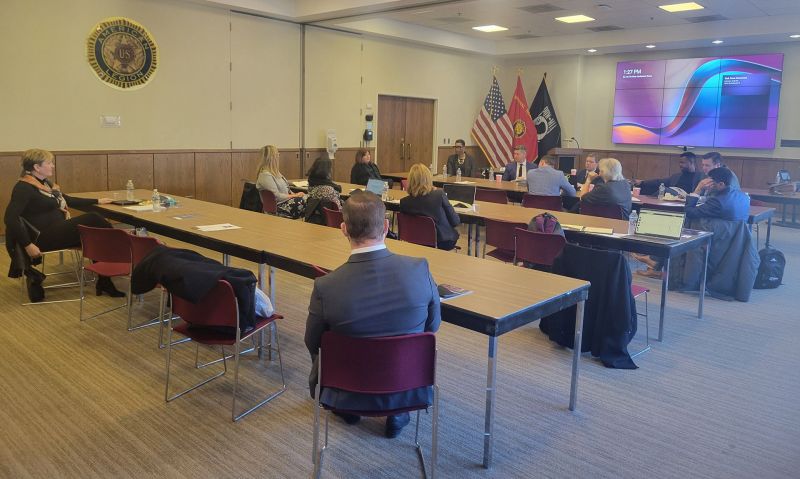
Task Force Movement: Less than two years old and growing fast
On Dec. 12, Task Force Movement (TFM) conducted a board meeting at The American Legion’s National Headquarters office in Washington, D.C., to get updates on the initiative’s longstanding trucking and cyber components and its newest area of emphasis, health care. Updates came from industry, agency, military and veterans groups that have teamed up to close gaps in the labor market with men and women who have served in uniform.
Unions, from those representing public utilities to elevators, continue to be involved with TFM programs and advancing veterans quickly into well-paying career paths. New board member Frank Christensen, general president of the International Union of Elevator Constructors (IUEC), for instance, touted his group’s long involvement with the Helmets to Hardhats program and the success the labor organization has had with veteran employees.
The board was updated on several pieces of legislation of interest to TFM and heard reports on each of the three main arms of the initiative.
Trucking: Teresa Watson, director of the Minority Professional Truckers Association, discussed what her group has been doing for independent owner-operators and farmers in the Southeast. Through a partnership with Cargill, the drivers can access classes on topics like profit/loss statements and communicating with shippers. Watson related instances of owner-operators going into the fields themselves to help farmers bring out their crops, and in 2024 expanded town-hall meetings will include both groups.
Jason Turner, vice president of talent and growth initiatives at ArcBest, described the “tale of two environments” in the trucking field between owner-operators and employees, and announced that 1,000 veterans have been brought into trucking careers through the company’s involvement with the DoD SkillBridge program.
Cyber: New TFM Cyber Chairman Dr. Jack Dever, CEO of Lockhaven Solutions, described being “absolutely energized … by the opportunity that’s out there” as he has gotten up to speed about veterans who may be coming out of the service with skills needed to fill a shortage of over 700,000 nationwide. He explained that cyber essentially equates to risk management, which touches many industries, including trucking and health care.
Dr. Yashika Neaves, chief of strategic plans and initiatives at the DoD Military-Civilian Transition Office, updated the group on the latest developments in SkillBridge. SkillBridge 2.0 is a combination of traditional training programs for the military-connected community and new ones. The focus is set to shift from credentialing to employment. Program approvals are moving again after a 60-day hold to catch up on the backlog, and Neaves said a new governance structure will bring SkillBridge more visibility, including at VA.
Health Care: TFM Healthcare Chairwoman Emily Haas said she has had many conversations with employers since this component’s inception in August, including such heavy hitters as Johnson & Johnson and Northwell. Staffing needs span the industry, from manufacturing and nursing to mental health and caretaking. Conversations with individual states have also begun, she explained.
State relations will be a focal point for TFM overall in 2024, according to Board Treasurer Brandon McPherson, senior vice president of strategy and operations for Warner Music Group. Another will be the pursuit of funding and scholarships from state and national sources; the next three to four months are “our time to shine,” he commented, adding that the initiative is “well-positioned” to take advantage of opportunities.
That position is thanks, in part, to board members’ involvement in these fields preceding the initiative’s introduction in the spring of 2022. TFM Executive Director Elizabeth Murray-Belcaster, president of EMB Consultants, Inc., says the genesis goes back to around 2010, when she and others first noted that servicemembers were coming back from Iraq and Afghanistan to an overall dismal job market – with one notable exception being trucking. That’s when the work began that has led to today’s TFM components. The American Legion has maintained a steady position of support for advancing veterans into specialized career fields and transferring military training time into credits for certification and licensure in those that require separate training.
TFM Chairman Patrick Murphy told the board that virtual Hiring Our Heroes job fairs, put on by the U.S. Chamber of Commerce Foundation, are set for Jan. 31 and Feb. 21, specifically in the areas of technology, cybersecurity and health care. Military-connected applicants can register for them online. Information on the Jan. 31 event that will focus on technology and cybersecurity can be found here. Information about the Feb. 21 event that will focus on health care can be found here.
Among those serving on the TFM Steering Committee is American Legion Veterans Employment & Education Division Director Joseph Sharpe.
